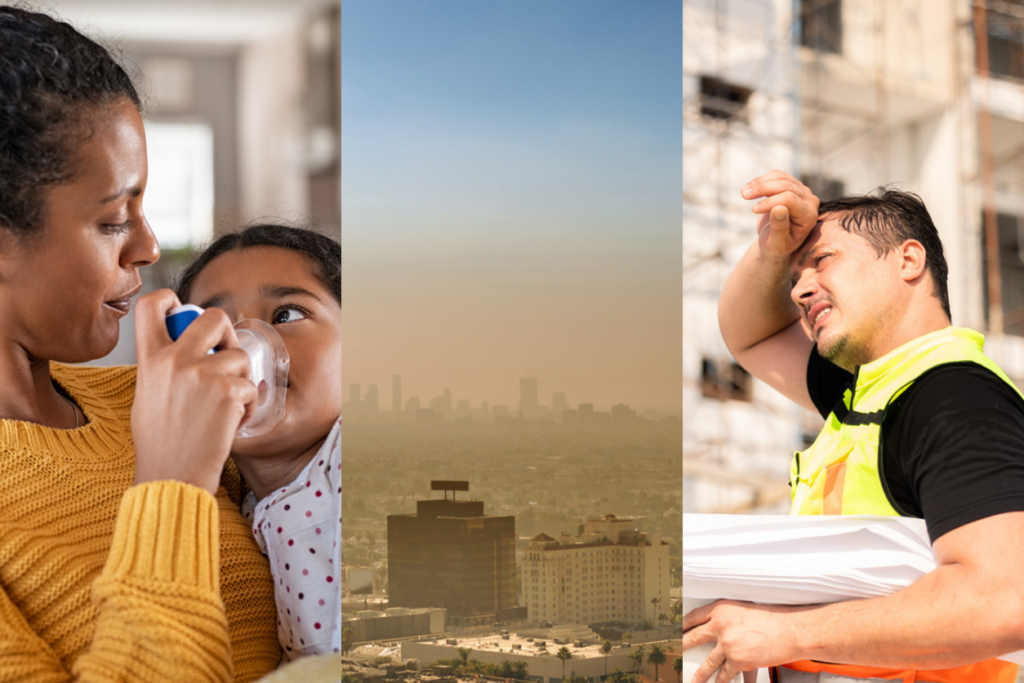FOR IMMEDIATE RELEASE
Contact: lppipress@luskin.ucla.edu
UCLA LPPI Launches First Dashboard Focused on Latino Neighborhood-Level Climate and Health Data
New digital resource reveals how extreme heat and air pollution are putting Latino neighborhoods at heightened risk—and provides data-driven support for more equitable policy.
LOS ANGELES (June 24, 2025) — Today, the UCLA Latino Policy and Politics Institute (LPPI) launched the Latino Climate and Health Dashboard, a groundbreaking digital resource that provides county-specific factsheets illustrating how Latino neighborhoods across California face heightened health and environmental risks.
As the first digital tool to bring together climate and health indicators on Latino neighborhoods in one place, the dashboard offers an accessible, data-informed view of the experiences of Latino and non-Latino white neighborhoods across 23 counties—representing over 90% of California’s Latino population. No other resource provides this level of localized, side-by-side comparison in a format that’s both clear and useful for action.
Developed with guidance from a statewide advisory committee of climate justice, public health, and data equity experts, the dashboard shows that Latino neighborhoods often face more extreme heat days and poorer air quality—two environmental conditions linked to climate change and associated with health disparities.
“Latino communities are on the frontlines of climate change, yet they’ve often been left out of the data and decisions that shape public health and environmental policy,” said Arturo Vargas Bustamante, research faculty director at LPPI and principal investigator for the project. “This dashboard puts reliable, localized data directly into the hands of policymakers, advocates, and residents so they can push for the equitable responses we urgently need.”
The dashboard includes publicly available data on dozens of environmental, health, and social determinants of health indicators—from fine particulate matter 2.5 (PM2.5) exposure and the number of extreme heat days to asthma rates and emergency room visits. Users can compare conditions between Latino-majority and non-Latino white-majority neighborhoods within each county, helping to make visible the long-standing disparities that often go unaddressed in policy debates.
The dashboard shows that Latino neighborhoods in many counties face significantly higher air pollution levels and more days of extreme heat than nearby non-Latino white neighborhoods. Residents in these neighborhoods also often report higher rates of emergency room visits for heart attacks, asthma, and heat-related illnesses. The disparities shown in the dashboard are not random.
“At its core, this dashboard helps answer a simple but vital question: Which communities in California are facing the brunt of climate and health consequences? ” said Julia Silver, senior research analyst at LPPI and the project lead. “We built this resource so that local leaders, community groups, and journalists have access to trustworthy centralized data that reflects what communities are experiencing every day—from unsafe air quality to worsening extreme heat conditions.”
The project was developed with funding support from The California Wellness Foundation, which invests in efforts to advance health equity and racial justice throughout the state.
The dashboard launch comes at a time of growing urgency. Under the new federal administration, environmental and health regulations are under threat, and extreme climate events across California are already breaking seasonal records this year. Yet many neighborhoods facing the greatest risks—often communities of color—are those with the least infrastructure to withstand climate-driven impacts that have lasting health impacts.
“We’re witnessing a broader assault on research and access to data,” added Silvia R. González, director of research at LPPI and co-principal investigator for the dashboard. “Hundreds, if not thousands, of federal web pages and datasets have disappeared, many containing critical information on health, environmental justice, and climate change. In this environment, independent, publicly accessible resources like the Latino Climate and Health Dashboard are essential—not just to inform better policy, but to preserve the public’s right to know.”
Designed to be user-friendly, the dashboard is expected to serve a wide range of users, from government agencies and health departments to community advocates and environmental coalitions. It presents this information through country-specific factsheets, offering localized data to support planning, disaster response, and long-term resilience efforts.
“The data presented by the dashboard makes it clear that inequity doesn’t happen by accident. It’s the result of long histories of underinvestment, zoning restrictions, and environmental neglect,” said Bustamante. “By shining a light on these patterns, we can start correcting them.”
For Silver, the dashboard represents a necessary shift toward inclusive climate and health planning. “We can’t design fair policies without understanding who’s most affected and where the need is greatest. This dashboard provides the evidence base to push equity-based policies forward.”
The Latino Climate and Health Dashboard is now live at latinoclimatehealth.org
###
About UCLA Latino Policy and Politics Institute:
The UCLA Latino Policy and Politics Institute is a non-partisan research institute that seeks to inform, engage, and empower Latinos through innovative research and policy analysis. LPPI aims to promote equitable and inclusive policies that address the needs of the Latino community and advance social justice. latino.ucla.edu.













